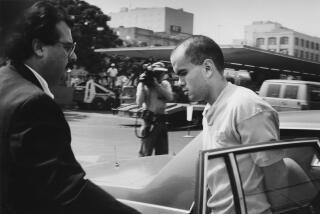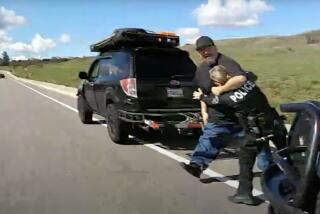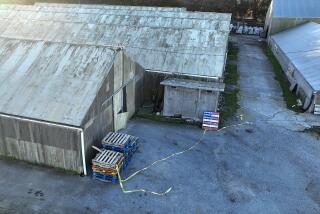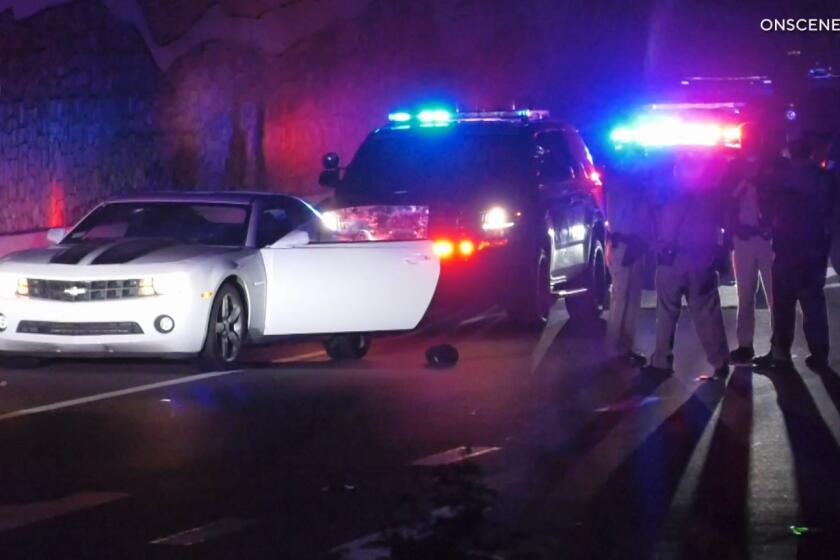Clinic to Focus on Women Who Have HIV, AIDS
Evelyn Jackson-McCarty doesn’t need to be told that growing numbers of women need specialized treatment for HIV and AIDS.
She need only look in the mirror.
For almost five years, the diminutive and optimistic Arleta woman has lived with HIV. But when she first learned she had the disease, she retreated from society, staying at home, watching TV for hours, going on eating binges. What’s more, she remembers thinking, AIDS was a man’s disease.
Finally, she tossed aside fears and sought treatment.
“A lot of women tend to trust men when it comes to having protected sex,” Jackson-McCarty said Monday. “But they have to learn to take more responsibility for their own lives.”
A new program for women with HIV and AIDS, she said, will help her and other women do just that.
Jackson-McCarty and other women spoke at a brief ceremony Monday marking the upcoming opening of the Women’s Clinic. In conjunction with the ninth annual World AIDS Day on Sunday, the Northeast Valley Health Corp. announced that the Women’s Clinic in Panorama City will begin offering specialized weekly outpatient treatment for women beginning in January.
The services, which include acupuncture, weight management and family counseling, are part of a program designed by social workers, health care experts and the patients.
With more than 4,600 people with HIV and AIDS living in the Valley, and women now accounting for a greater percentage of all cases nationwide, Dr. Mark Henrickson said the clinic is an important step for the San Fernando Valley.
“Women are not just men with different plumbing,” said Henrickson, director of HIV/AIDS services for the Northeast Valley Corp. Women, he said, “have a totally different set of cultural needs” than men.
In addition to the clinic, Northeast Valley Health Corp. will start the HIV Cybermall, a five-year program funded by the federal government to strengthen ties between AIDS service agencies in the Valley through a computer network.
Henrickson said many AIDS or HIV patients leave the Valley and go “over the hill and seek treatment when they should know that services are available right here.”
With huge immigrant populations in mind, the clinic will also feature bilingual counselors and reach out to more people of color. Both Henrickson and Jackson-McCarty urged more African American and Latina women to get tested early and on a regular basis.
A decade ago, women made up 3.9% of the AIDS population in the United States, but now they are 12.6 percent of the total cases. Henrickson said health care agencies see the rise as a “foreshadowing of things to come.” The numbers prompted the Northeast Valley Corp. to reallocate existing funds to cover the program.
When AIDS first became big news in the 1980s, Katrina Remund was living with her boyfriend. In 1982, he admitted having an affair with another man and told Remund she should get tested. Three years later Remund found out she was HIV-positive.
“A lot of married women think they are safe and can’t catch HIV,” Remund said. “But not only do their husbands cheat, but some are intravenous drug users too.”
Back when she got the virus, Remund said, there was little counseling and few services for women. But now, after adopting her 6-year-old son, Nicholas, and living with the virus for 12 years, Remund figures more women should be told that life can go on.
“Having a clinic like this can help women deal with a lot of psycho-social issues like the shame, guilt and ugliness some women experience,” she said. “For years I thought no one would love me. But look at me today.”
More to Read
Start your day right
Sign up for Essential California for news, features and recommendations from the L.A. Times and beyond in your inbox six days a week.
You may occasionally receive promotional content from the Los Angeles Times.





